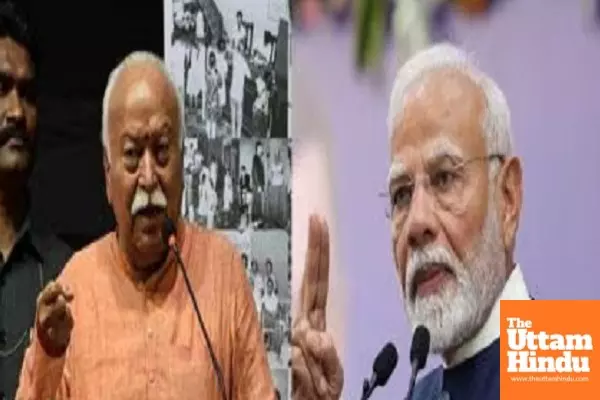
RSS-BJP Alliance Strengthens in Haryana, Prepares for Next Battlegrounds: Maharashtra and Jharkhand

New Delhi (The Uttam Hindu): The historic win of the BJP in Haryana not only provides a significant boost ahead of the critical Maharashtra Assembly elections but also helps mend perceived rifts in the party's relationship with the RSS. The success in Haryana, attributed in part to the on-ground efforts of the Sangh Parivar, has reaffirmed the "mutual dependence" between the BJP and RSS.
During a recent press conference at the Akhil Bharatiya Karyakari Mandal Baithak in Mathura, Uttar Pradesh, RSS General Secretary Dattatreya Hosabale emphasized that relations between the Sangh and the BJP remain strong. He addressed BJP national president J.P. Nadda’s earlier comments to The Indian Express suggesting the BJP was capable of operating independently without the RSS, clarifying that the Sangh understood the "spirit" of Nadda's statement and that it did not create any tension.
While BJP leaders maintain there was no significant stress between party workers and the Sangh, sources suggest the Lok Sabha election setbacks served as a wake-up call for both parties to collaborate more effectively.
The RSS, which has seen its influence with the BJP wane under the strong leadership of Modi and Shah, found the Haryana victory validating its organizational strength and election impact. However, some issues needed resolution, which sources indicate occurred through discussions during recent RSS meetings in Ranchi, Palakkad, and Delhi. A source mentioned that there was never an ideological conflict between the two groups, but rather operational challenges that are now being addressed.
Part of this effort includes the assignment of monitoring Prime Minister Modi’s flagship schemes to Union Minister and former Madhya Pradesh Chief Minister Shivraj Singh Chouhan, who is favored by the RSS and is considered a frontrunner for the next BJP president.
Signals of renewed collaboration can also be seen in PM Modi’s post following RSS chief Mohan Bhagwat’s Vijayadashmi address, where he urged citizens to focus on "important national issues."
In Haryana, the RSS’s traditional methods of grassroots networking and social outreach effectively countered the Congress-led opposition's claims about potential constitutional changes under a BJP government. While the opposition appeared overconfident and overlooked this subtle campaigning, the BJP successfully garnered support from non-Jat OBCs and a substantial segment of Scheduled Caste voters.
According to sources, the BJP had previously identified that while it held an advantage in 44 out of 90 Assembly constituencies in Haryana, it had fallen short in some areas due to “mismanagement.” In the Lok Sabha elections, the party struggled to engage apathetic voters, who were either overly confident in the BJP’s position after a decade in power or disillusioned by candidate selections. Many did not participate in the voting process, as noted by a BJP leader.
“The solution was to mobilize them for campaigning and voting. RSS volunteers stepped in to assist,” explained one leader.
The BJP hopes to similarly rally support among OBC and SC/ST communities in Maharashtra to counter the Maha Vikas Aghadi's focus on Marathas and Muslims. While the Congress has significant support among the Mahar community, the RSS is engaging with the Matang caste groups.
The Eknath Shinde government’s decision to form a committee to discuss sub-classification within the SC quota is believed to have been influenced by the RSS. This approach to sub-classifying SC communities is thought to have also benefited the BJP in Haryana.
“If the opposition leveraged statements from BJP leaders about aiming for over 400 seats during the Lok Sabha elections, we countered that using Rahul Gandhi’s remarks about reevaluating reservations after achieving societal equality,” a source remarked. The RSS's traditional methods proved useful in this regard.
Additionally, sources noted the initiation of a quiet "Save Constitution" campaign by the RSS in August, following the Lok Sabha results. This initiative, known as the 'Samvidhan Jagar Yatra,' began at Mahad’s Chavdar Tale, a historical site where Babasaheb Ambedkar launched his significant Mahad Satyagraha in March 1927 to demand access for untouchable communities.
In the other poll-bound state, Jharkhand, the RSS maintains a strong base through its engagement with tribal communities. It has mobilized volunteers into small units within tribal areas to reverse the losses the BJP faced during the Lok Sabha elections, where it failed to secure any of the five tribal-dominated seats. One focus area for the RSS is Santal Pargana, a stronghold of the JMM, where the BJP's campaign emphasizes alleged Bangladeshi “infiltration” affecting tribal demographics, a message amplified through its workers in border regions.

